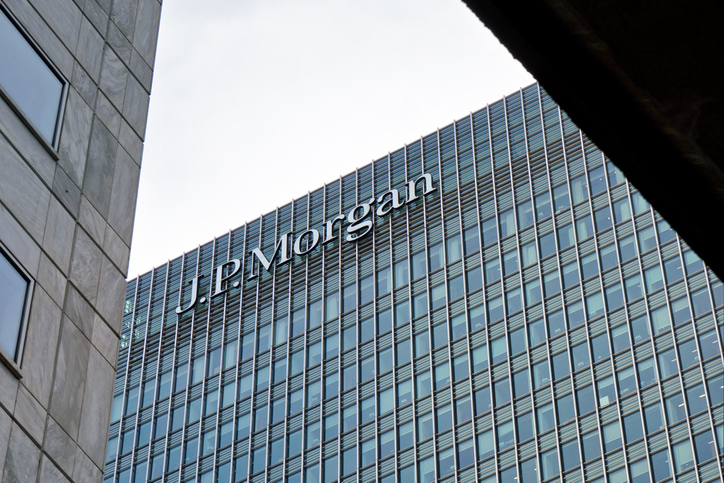ii view: JP Morgan justifies star status with record profits
Shares for this US economic bellwether are up over 70% since March. Buy, sell or hold?
15th January 2021 16:01
by Keith Bowman from interactive investor
Shares for this US economic bellwether are up over 70% since March. Buy, sell or hold?

Fourth-quarter results to the end of December 2020
- Net revenue up 3% to $30.2 billion
- Net income up 42% to $12.14 billion
- Earnings per share up 47% to $3.79
Chief executive Jamie Dimon said:
“JPMorgan Chase reported strong results in the fourth quarter of 2020, concluding a challenging year where we generated record revenue, benefiting from our diversified business model and dedicated employees.
“We ended the year with a CET1 ratio of 13.1% (vs. 12.4% at the beginning of the year) and capital above $200 billion, providing us with meaningful capacity to further invest in our business and communities, while returning capital to our shareholders.”
ii round-up:
US banking giant JPMorgan Chase (NYSE:JPM) today reported record quarterly profit, or net income, of $12.1 billion, pushed higher by both continued strong trading across its markets business and the return of cash from previously set aside bad debt provisions.
Earnings per share of $3.79 flew past consensus analyst estimates of nearer $2.70. Non-interest revenue rose by 13% to $16.8 billion, helped along by higher investment banking fees. Equity markets related revenue jumped by 32% to $2 billion.
The return of cash from previously made loan provisions helped power the end-of-year quarterly results by $1.9 billion, with management highlighting both positive vaccine and stimulus developments as contributing factors.
JP Morgan shares fell by 2% in early US trading, having risen by over 70% since pandemic lows last March, marginally outperforming the broad S&P 500 index. Shares of Barclays (LSE:BARC) and Deutsche Bank (XETRA:DBK) are up by a similar amount since March, while Asia and Hong Kong focused HSBC (LSE:HSBA) is down over 15%.
Despite the return of cash from provisions, credit reserves of over $30 billion reflected significant near-term economic uncertainty, according to the bank’s chief executive Jamie Dimon.
Net interest income declined by 7% to $13.4 billion due to the impact of lower interest rates following central bank action to battle the pandemic. Higher rates give banks more scope to widen the difference between deposits and lending rates, borrowing from customers at deposit rates and lending out as loans at higher rates. However, assets under management for its wealth management business rose by 17% to $2.7 trillion. Again, aided by Central Bank action.
In December, JPM, the biggest US bank by stock market value, declared a quarterly dividend of 90 US cents per share, unchanged from the previous quarter. It also announced its intention to recommence share buybacks in the next quarter - previously suspended under pandemic caution.
ii view:
JP Morgan operations cover both traditional consumer and corporate banking, along with investment banking and asset management. North America generates around three-quarters of its revenues, leaving the mammoth bank as something of a bellwether for the wider US economy.
For investors, ongoing pandemic uncertainty continues to dominate concerns for the outlook. A change of administration could also bring changes in corporate taxation given stretched government finances. The dampening impact of ultra-low interest rates on net interest income also looks unlikely to change any time soon.
But management’s likely desire to get ahead of the game by over-provisioning early in the pandemic is now being rewarded. The CEO’s description of what he calls the bank’s “fortress balance sheet” should also not be overlooked. Neither should a dividend yield of over 2% and a pending recommencement of share buybacks. In all, while there is clearly much good news in the share price, JP Morgan is arguably one to own for the long term.
Positives:
- Business diversity
- Pending recommencement of share buybacks
Negatives:
- Ongoing pandemic uncertainty
- Lower interest rates are broadly bad for bank profitability
The average rating of stock market analysts:
Buy
These articles are provided for information purposes only. Occasionally, an opinion about whether to buy or sell a specific investment may be provided by third parties. The content is not intended to be a personal recommendation to buy or sell any financial instrument or product, or to adopt any investment strategy as it is not provided based on an assessment of your investing knowledge and experience, your financial situation or your investment objectives. The value of your investments, and the income derived from them, may go down as well as up. You may not get back all the money that you invest. The investments referred to in this article may not be suitable for all investors, and if in doubt, an investor should seek advice from a qualified investment adviser.
Full performance can be found on the company or index summary page on the interactive investor website. Simply click on the company's or index name highlighted in the article.